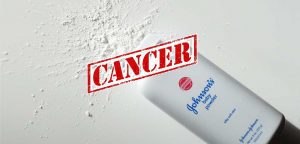
UPDATE: (2020) – Johnson & Johnson has ‘phased-out’ sales of its talc-based baby powder in the United States. According to Carl Tobias, a University of Richmond professor who teaches product liability law, “This fences the litigation pretty neatly. It sets a date that says after this, the claims won’t fly because everyone is on notice about the talc allegations.”
If you or a loved one have used Johnson & Johnson’s Talc-based Baby Powder or “Shower-to-Shower” products and been diagnosed with Ovarian Cancer or Mesothelioma, contact us online or call 1-866-252-3535.
![]()
UPDATE: (Feb. 2020) – On February 6th, a New Jersey jury awarded four plaintiffs $750 million in punitive damages and $37.2 million each in compensatory damages. The jury’s message to Johnson & Johnson was a powerful one.
All four plaintiffs plaintiffs used J&J’s talc-based Baby Powder and/or “Shower to Shower” products when they were much younger, and all four were subsequently diagnosed with Mesothelioma.
This follows several other substantial jury verdicts holding J&J liable for their talc-based products causing ovarian cancer and Mesothelioma:
- April 2018: $117 Million verdict linking J&J’s baby powder and the development of Mesothelioma.
- May 2018: $27 Million verdict linking J&J’s baby powder and the development of Mesothelioma.
- July 2018: $4.69 Billion verdict linking J&J’s baby powder and ovarian cancer in 22 women.
- September 2018: $417 Million verdict linking J&J’s baby powder to the plaintiff’s ovarian cancer.
Reuters has published a remarkable report dubbed “Powder Keg” that is a MUST read: “J&J Knew for Decades that Asbestos lurked in its Baby Powder”.
A corresponding article by Reuters demonstrates just how far J&J has gone to put profits over people: “J&J Kept a Guiding Hand on Talc Safety Research”.
In 2013, a study published in the medical journal Cancer Prevention Research looked at data on about 2,000 women who used talcum powder on the genital area. The findings suggested that women who use talc body powder may face a 20% to 30% higher risk of ovarian cancer when compared to women who do not use the baby powder or body powder products. The original link between talcum powder and ovarian cancer was discovered in 1971 in a medical study that demonstrated talc particles in the ovarian tissue for cancer patients. As early as 1971, Johnson & Johnson’s medical director Dr. G.Y. Hildick-Smith argued against the suggestion that talc is carcinogenic. This was the first instance in which medical professionals realized that women could be at risk for a consistent use of these products.
Following the 1971 study that first detected a connection between talcum powder use and ovarian cancer, many more scientific studies have been published in prominent medical journals such as Cancer, The Lancet, and Oncology throughout the past decades. The National Cancer Institute and the International Union Against Cancer have published similar findings. A description of pivotal studies on the baby powder and ovarian cancer is set forth here:
-
- 1970s An article on ovarian cancer caused by talcum powder in The Lancet warns, “The potentially harmful effects of talc . . . in the ovary . . . should not be ignored.”
- 1992 The Journal of Obstetrics and Gynecology publishes a study which finds that regular (weekly) use of baby powder increases a woman’s risk of developing ovarian cancer threefold.
- 1997 A study published in the American Journal of Epidemiology affirms that perineal dusting of talcum powder contributes to the risk of cancer; it suggests talcum genital deodorant sprays contribute to cancer growth as well.
- 2003 A meta-analysis, which compiles and reviews data from 16 previous studies, is published in Anticancer Research. Based on research with nearly 12,000 women, the study concludes that perineal baby powder use is associated with a 33% increase in ovarian cancer risk.
- 2008 Harvard epidemiologist Dr. Margaret Gates reaffirms that weekly use of talcum powder for perineal dusting increases the risk of ovarian cancer by 33%. Dr. Gates also asserts that daily use of a product such as Johnson & Johnson’s Shower to Shower talcum powder increases the risk of ovarian cancer by 41%.
- 2010 Dr. Gates, along with two other Harvard researchers, publishes a study in the journal Cancer Epidemiology, Biomarkers and Prevention in which the role of talc particles in other endometrial cancer development was investigated. This study reinforces the notion that talc in baby powder is carcinogenic to humans.
Despite these original findings, companies like Johnson & Johnson continue to argue against the severity of the risks posed by talcum powder. It is simply another example of manufacturers placing their desire for profits before consumer safety by withholding information about the potential cancer risk from consumers for years.
If you or a loved one have used Johnson & Johnson’s Talc Products (Baby Powder or “Shower-to-Shower”) and been diagnosed with Ovarian Cancer or Mesothelioma, contact us online or call 1-866-252-3535.
